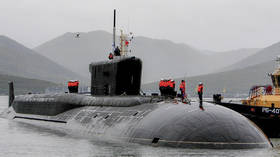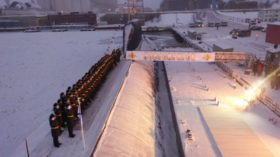Russia tests new nuclear submarine – Navy chief

Russia is conducting a trial run of a new strategic nuclear submarine, the Navy commander in chief announced on Sunday, at a time of heightened tensions with the West.
“The newest nuclear-powered strategic missile undersea cruiser Generalissimo Suvorov is being tested,” Admiral Nikolay Yevmenov said, speaking on the 326th anniversary of the Russian Regular Navy’s establishment.
The Navy chief said the submarine was built at the Sevmash enterprise, Russia’s largest shipbuilding facility, in the northern city of Severodvinsk.
The ‘Generalissimo Suvorov’ is the sixth vessel of Russia’s 4th generation ballistic missile submarines and the second mass-produced ship of the upgraded Borei-A class. Each Borei-A vessel can carry up to 16 Bulava-class submarine-launched ballistic missiles, which could be armed with nuclear warheads. The boat was named after the 18th century general Alexander Suvorov, who is considered one of the greatest military commanders in Russian history.
Yevmenov went on to say that the Russian Navy is being reinforced by other state-of-the-art new ships, including the ‘Ufa’ diesel-electric submarine, which “has successfully passed official testing.” The vessel, which is intended for the Russian Pacific Fleet, is expected to be formally accepted by the Navy next month, he stated. Submarines of this type are armed with ‘Kalibr’ cruise missiles.
Earlier this week, Russian President Vladimir Putin personally oversaw nuclear strike drills involving Moscow’s land, sea, and aviation deterrence forces. This military activity coincided with similar exercises conducted by NATO, named ‘Steadfast Noon.' The bloc’s nuclear drills, which are set to last until October 30, are taking place over Belgium, the North Sea and the UK. Despite high tensions between Russia and the West, NATO described the exercises as “routine” and “not linked to any current world events.”
In the context of the Ukraine conflict, Putin recently vowed that Russia would use “all the means available to us” to defend its people and territory, a statement that Washington and its NATO allies have interpreted as a veiled threat to deploy nuclear weapons. However, several Russian senior officials insisted that Moscow is not threatening anyone with its nuclear arsenal.













